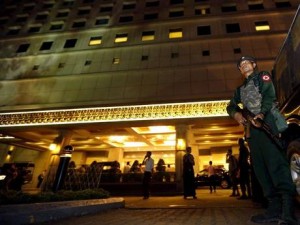“Cool Heads” Needed as Bombings Tear Through Burma
By Burma Partnership • October 21, 2013 A string of bombings around Burma have rocked the country, killing three and injuring at least 10 people. Arrests were made on 18 October, with police stating that those behind these attacks were Karen businessmen trying to deter foreign investment in resource rich Karen State. Despite this, there is still much debate as to the true perpetrators and their motives.
A string of bombings around Burma have rocked the country, killing three and injuring at least 10 people. Arrests were made on 18 October, with police stating that those behind these attacks were Karen businessmen trying to deter foreign investment in resource rich Karen State. Despite this, there is still much debate as to the true perpetrators and their motives.
On 11 October, the first serious explosion occurred in Taungoo, Pegu Division, killing two. On 13 October, two bombs exploded in northern Rangoon, causing damage but injuring no one. Further explosive devices were found in restaurants in Rangoon and Mandalay on 14October which were detonated in controlled explosions by the police. Later in the same evening, a bomb exploded in a room of Rangoon’s Traders Hotel, injuring an American woman. Traders Hotel is one of the best known and upmarket hotels in the country, and is popular with both foreign and domestic tourists. On the night of 16 October and the morning of 17 October, three bombs more were detonated in Namhkam, Shan State, killing one person and injuring several more.
Authorities arrested Saw Myint Lwin, a former Karen National Union (KNU) member, although it is important to note that ethnic non-state armed groups, particularly the KNU, have distanced themselves from this violence and pledged to support the investigation. Mahn Nyein Maung, Central Executive Committee Member of the KNU stated, “This was not a plan by our leadership – we will carry out investigations to find out whether our members were involved and take necessary actions if they were – we will not allow any harm to our peace process.” This statement is significant as in the past, the military regime is widely believed to have instigated such bombing attacks, and used the instability to justify further repression of ethnic opposition and political dissidents by pinning the blame on them without any transparent investigation. The military regime has also targeted human rights activists, such as Myint Aye, the leader of Human Rights Defenders and Promoters, accusing him of planning to plant a bomb in Shwe Pyi Thar Township, Rangoon, in 2008.
At a press conference on 18 October, the Director-General of Burma’s Police Force, Zaw Win announced the arrest of eight suspects and outlined their motivation, “According to our investigation, there is clear evidence that this was an attempt to deter foreign investment in the country.” The main suspect, however, was not among those arrested and he has been identified as Nay Toe, who manages a business owned by the KNU, thus adding further unanswered questions over why this has happened.
Burma’s transition is in a state of flux, and these bombings highlight the fragility of politics in Burma today. In the context of the upcoming Southeast Asian Games, Burma taking the ASEAN chairmanship next year, the possible signing of a controversial nationwide ceasefire next month, and discussions throughout the country of amending the 2008 Constitution, the country is at a vulnerable stage. Amidst the confusion, it is Daw Aung San Suu Kyi’s words that resonate, “The public may be worried, but I believe that our people know how to keep a cool head. These [bombings] are deliberate attempts to cause public panic and it is important for people not to fall into the trap.” Cool heads and not falling in to the trap of the blame game are indeed essential right now.
Tags: Bombs, Burma PartnershipThis post is in: Blog
Related PostsKNU Statement on Bombing near Capital of Burma’s Dictators
Thingyan Bombing Shows Instability Under SPDC Rule
A New Year but the Same Injustice: Concerns for Dissidents in the Aftermath of Bombings
Junta Adamant About Continuing Dam Project Despite Blast
Four Killed, 12 Injured in Bomb Blasts in Irrawaddy-Myitsone Dam Site









 All posts
All posts